
by Shane Joaquin Jimenez
Scott Alexander Jones is the author of two recent books of poetry, elsewhere (Black Lawrence Press, $13.95) and Carpe Demons (Unsolicited Press, $15), both published in 2014; another book titled That Finger on Your Temple is the Barrel of My Raygun is forthcoming from Bedouin Books. Each of his books is singular—elsewhere is a long poem about the fleeting passage of time, while the impressionistic Carpe Demons reads like a collection of Japanese death poems—but all of his work emanates from a Zen-inspired awareness of the ephemerality and absurdity of existence. As he writes in Carpe Demons: “The graveyard’s patient / As the landfill . . . ”
Scott and I met a decade ago as undergraduates at the University of Texas at Austin, where we both majored in English and worked in the Life Science Library at the Tower—the infamous site of Charles Whitman’s 1966 sniper massacre. We bonded over our shared appreciation for Allen Ginsberg and the cathedral-like solemnity of the Life Science Library’s reading room in the early morning. After graduating, Scott began a period of intense restlessness and travel, which only ended earlier this year when he settled down in Bozeman, Montana. During this period, Scott earned his MFA from the University of Montana, co-founded (with me) the literary zine Zero Ducats, and published his first chapbook, One Day There Will Be Nothing to Show We Were Ever Here (Bedouin Books, 2009).
This interview took place over e-mail over the course of several days, slowed at times by the vagaries of life—stomach bugs, work—and sped up at other times by deadlines and looming travels. I often typed out my questions in my home in North Portland with the lonesome cries of freight trains in the distance. I do not know what Scott’s soundtrack was.
Shane Joaquin Jimenez: I’d like to start our conversation by setting the scene. Where are you right now?
Scott Alexander Jones: This very moment, I’m looking up at log rafters in an office filled with old books and scrolls of topographical maps of nearby wilderness, like the Gallatin Range, which I currently live along the edge of and can see outside the window right now, along with some yellow flowers.
SJJ: Is this old office of yours where you write?
SAJ: Not particularly. I’m a pretty undisciplined writer, in the sense that I don’t write daily and never set aside a special time to write. Like Frank O’Hara, I tend to jot things down the moment an idea strikes, which could be anywhere: at a coffee shop, on a plane, in a park.
SJJ: Let’s talk more about this process. How do these moments of inspiration become books? In the words of Quentin “Q” Morewood, “What is the bridge from the water’s edge of inspiration to the far shore of accomplishment?”
SAJ: Lovely platitude. Here’s another one I can hear Rip Torn reciting pretentiously: “A poem isn’t finished, it’s only abandoned.” I forget who, if anyone, actually said that, but I tend to agree. Or at least I used to. I used to struggle to craft the perfect poem, revising compulsively, only stopping when I realized my focus had shifted into something entirely different and it was time (continuing with the maritime metaphor) to abandon ship and dive into something new.
These days, though, I usually just start with some sort of triggering vision and see what rabbit hole it takes me down, without any conscious agenda, and the words fall into place pretty naturally. Whenever I start a new poem, I rarely know how it’s going to end; I’m always trying to surprise myself with some strange lingering moment to end on.
SJJ: But why poetry? It seems like in the time I’ve known you, the trajectory of your work has taken you from meticulous craftsmanship to a Ginsbergian, Zen place of “spontaneous mind.” Is there something specifically about poetry that lends itself to following these triggering events? What ultimately appeals to you about poetry’s form?
SAJ: I think I like that poetry is time-based, with a set beginning and end—as opposed to, say, sculpture or painting. I just as easily could have gotten into film or video art, I guess, but it would’ve been more costly, risky, and required much more planning. With poetry, you can simply write down the vision as it comes and then move on to the next, without having to over-analyze or beat it to death.
SJJ: Can you talk about how you came to poetry?
SAJ: I started reading it in high school in suburban North Texas in the late 1990s, when I discovered Ginsberg, whom I’d never heard of, in an anthology. The risqué language caught my eye, and I ended up reading The Lion For Real aloud to the class. Everyone stared at me blankly, instead of laughing, like I’d thought they would, which let me know I was onto something.
SJJ: What books were you reading during the time you began writing poetry?
SAJ: Biographies and autobiographies. Dozens of them, mostly on or by dead writers: Walt Whitman, Emma Goldman, Gregory Corso, Lorca . . . These just popped in my head, and I’m wondering if it’s partly because each last name almost rhymes with the previous one. I’ve been trying to tone down the musicality in my writing, but a lot of it seems to be subconscious, like the sound of Whitman triggering Goldman triggering Corso triggering Lorca.
Back to your point, though, when I began writing a decade ago, in Austin, I didn’t just want to read what poets wrote; I wanted to learn how they came to write what they wrote, what kinds of lives they led, where they traveled, who they met. So I churned through a good deal of nonfiction. Which, I think, is what brought me to the underlying subject I can’t seem to get away from: impermanence (my first book was called, not too subtly, One Day There Will Be Nothing to Show That We Were Ever Here). Something about seeing the full trajectory of an interesting life, or at least the outline of one, helped me grasp how fleeting all these tiny moments are.
Which is where the Zen thing comes in. Increasingly, I’m drawn less to wordplay and more to passing moments distilled clearly and economically. Whitman said it best: “Just as you feel when you look on the river and sky, so I felt.” Or this great Japanese tanka poet from a hundred years ago, Bokusui Wakayama: “Eyes closed, you lean on a tree and listen to the sea. What is hidden in that distant sound?”
 SJJ: I’m glad you brought up some recurrent themes in your work. You published two books last year—elsewhere and Carpe Demons—both of which deal with the insignificance of human life on geologic and stellar time scales. Are these books connected in any way? What structural and thematic similarities/differences do you think exist between the two?
SJJ: I’m glad you brought up some recurrent themes in your work. You published two books last year—elsewhere and Carpe Demons—both of which deal with the insignificance of human life on geologic and stellar time scales. Are these books connected in any way? What structural and thematic similarities/differences do you think exist between the two?
SAJ: I hadn’t really thought of it before, but yeah, in a way they are like companion pieces, interconnected in that they both explore the broad concept of impermanence, both cosmic and personal, by zeroing in on specific visuals, landscapes, interactions, etc. But if the long poem elsewhere, with its color and fluidity, feels sad and slow like a Terrence Malick film (a graceful hand skimming the top of a wheat field), then Carpe Demons is more like David Lynch (something lurking in the dark corner of your room). If elsewhere laments impermanence, Carpe Demons thumbs its nose. If elsewhere is a dream, Carpe Demons is a fever dream.
SJJ: Intriguing distinction. I wonder, though, how this all ties into the notion of impermanence. Why is this such a resonant theme for you?
SAJ: The poets with the most staying power, I think, address universal experiences by focusing on the particulars of their surroundings, and a lot of them lived quite a while ago. Poets from centuries ago who seem to be addressing future generations, you can tell their worlds felt as real to them as this one does to us, yet they somehow tapped into the ephemeral nature of things. The most striking ephemeral poetry I’ve encountered comes from Japanese Zen monks and haiku poets, who often wrote a final poem before dying.
The dream/fever-dream distinction, for me, illustrates two different ways of responding to one thing. So, reflecting on impermanence, you can either be meditative and melancholic, or you can respond with humor and irreverence. Two Japanese death poems illustrate each of these approaches nicely. Over a thousand years ago, a nobleman named Minamoto-No-Shitago calmly and evocatively wrote:
This world—
To what may I liken it?
To autumn fields
Lit dimly in the dusk
By lightning flashes
Then, about five hundred years later, a Zen monk named Shumpo Soki, who had earlier written a poem threatening to behead the Buddha, gathered his disciples together and crudely instructed them:
No single bone in my body is holy—
It is but an ash heap of stinking bones.
Dig a deep hole and there bury these remains
Thus, not a grain of dust will stain
The green mountains.
Though drastically different in tone—one melancholic, the other abrasive and absurdist—each of these responses feels honest and deeply insightful. Two sides of the same coin. These days, I’m trying to find ways of hitting both of these registers at once.
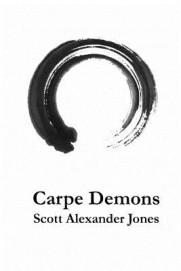 SJJ: Readers can see these fingerprints of Zen all over your work. Both elsewhere and Carpe Demons begin, for instance, with epigraphs by long-dead Zen monk poets (Gizan Zenrai and Kokei Sochin, respectively). And the cover and poem “titles” of Carpe Demons all share the spontaneous no-mind-ness of ensō brushstrokes. But your poems also don’t shy away from random, everyday observations from your 21st-century life (“The redbrick porn theater / Horse rings in ruptured sidewalk”), which in a way is even more Zen.
SJJ: Readers can see these fingerprints of Zen all over your work. Both elsewhere and Carpe Demons begin, for instance, with epigraphs by long-dead Zen monk poets (Gizan Zenrai and Kokei Sochin, respectively). And the cover and poem “titles” of Carpe Demons all share the spontaneous no-mind-ness of ensō brushstrokes. But your poems also don’t shy away from random, everyday observations from your 21st-century life (“The redbrick porn theater / Horse rings in ruptured sidewalk”), which in a way is even more Zen.
SAJ: Yeah, I had forgotten that the epigraph for elsewhere ended up also being from a Zen monk. It was originally a transcription of something Daniel Johnston said at a small concert in a record store in the mid-1980s (which I ultimately couldn’t secure the rights to): “One more time. With feeling. Everybody. It’s gonna happen. You know it’s gonna happen. It happens every day. Billions and billions of people have already died. And you too will die. Sing along with us, won’t you.”
That’s about as subtle as a punch to the face, but I liked how the last thing he said was so collective and welcoming, “Sing along with us, won’t you,” like we’re all gonna die but we’re all in this together. Also, “billions and billions” was Carl Sagan’s go-to phrase, so I associate that with a sense of cosmic awe.
I’m glad you brought up that line about the theater and the rings in the sidewalk. I wrote Carpe Demons in Portland—right around the time you moved there, I think—and those were a couple of images I made note of outside the window of the coffee shop on SE Division where I wrote that book.
When I visited last spring, that area looked completely different, with lots of new tall buildings and boutiques where empty lots and dilapidated houses used to be. They were just starting to break ground on a lot of those places when I was writing that book, with jackhammers going everywhere, which probably helped inform the sense of flux. Also, the iron rings in the sidewalk, which are all over Portland, were used back in the day to tie your horses to, so that seemed to encapsulate the vanishing nature of things pretty well.
It’s always a bit strange to me to see modern haiku and tanka talk about cherry blossoms and lily pads instead of, say, highways and light bulbs . . . I was just about to say this feels escapist, but I guess I’m guilty of never writing about modern technology like iPhones or iPads. I’m sure an actual Zen monk would find computers just as ephemeral as falling leaves.
SJJ: I find it really interesting how place can seep into one’s work, especially in poetry with all its elbowroom for inward, autobiographical exploration. You’ve lived in many different locales in your life—as varied as Austin and Missoula and Prague—and I wonder if you’ve found much connection between the places you’ve lived and the kind of writing you’ve produced.
SAJ: Absolutely. Moving to new places always gets the juices flowing, but it’s somewhat less quantifiable than just autobiographical and location-specific details (although, as we’ve discussed, what’s immediately in front of me is crucial to what I do). When I lived in Wellington, New Zealand in 2010–2011, the poetry I wrote was deeply informed by the landscape—the otherworldly beauty over there is pretty impossible to ignore—and I often described what I saw from the balcony of the rickety bungalow I was living in, overlooking downtown and the bay and Mount Victoria.
But that’s also when my writing style became—or at least I hope it became—a bit less precious and “poetry” (read with a snooty British accent) sounding. That’s the part that’s less tangible. Something about packing up and changing your surroundings completely seems to get the mind working in a different mode, allowing for more formal experimentation. The words come somewhat differently in new cities.
Also, it becomes much easier to reflect on experiences in previous cities after you’ve moved on. So, writing about New Zealand became easier when I was in Kansas, and writing about Kansas was easier in Prague. All this moving around—or rather, the obsession with the next place to visit, which, as I’m learning, often distracts from the present moment—was what elsewhere revolved around.
You were living in Seoul when I was in Wellington, and I remember you were working on a novel at the time. Did you have a similar experience with being able to write in a new style and reflect on past events more lucidly after moving from Colorado to South Korea?
SJJ: Absolutely. The title of elsewhere really gets at this experience, with all its nostalgic, wanderlusty evocations. Like you, I’ve always found it easier to write about a city when it’s in the rearview mirror, like writing about the landscape and people of Texas while living in New York and Boulder. And as you mentioned, I spent two years in Seoul writing about a summer I had spent a few years before living in the Shakespeare & Company bookstore in Paris. For writers at least, I think it’s part of a natural, age-old process of trying to make sense of the past by arranging its details into a tidy narrative.
SAJ: What’s even more interesting is that everyone—not just writers—makes sense of the past by arranging disparate details into a coherent narrative. There’s a strong argument to be made for the whole notion of “the self” being simply the running story of our lives that goes on in our minds and that we tell others.
SJJ: That reminds me of something David Mamet once said: “There is no such thing as character other than the habitual action, as Mr. Aristotle told us two thousand years ago.” I think that you’re right that this extends outside of the page, to the interior lives of every person.
SAJ: Or to put it slightly differently, storytelling starts in the interior lives of every person—it’s biologically engrained in us all to tell and be drawn to stories, the way birds know to fly north—and writers simply capture this natural state and turn it into art. There are a few different theories, all of them compelling, for why people like you and me do what we do: to exercise the brain in cognitive play, to display skillful minds for the sake of sexual selection, to learn vicariously about culture and psychology, to come together around common values, or—by far the strangest option—to feed an addiction that stems from arbitrary glitches in our brains. Could be some combination.
I’m fascinated with how storytelling predates written language, how people have been telling stories for ages—maybe even since before we were human in the modern sense.
SJJ: This idea of a continuum of storytellers and writers has come up a few times in this conversation. I’m reminded of the following section from elsewhere:
I imagine you imagining me savantly
idiotic, replenishing
a century of sultry swimsuit
calendars with deadmen I will have lived beyond
You go on to list dates on which you will have lived longer than other writers who have meant something to you—April 6, 2018 for Rimbaud; January 8, 2052 for Corso; nine days after that for the dharma lion himself, Ginsberg. And I wonder, with your awareness of the fleeting nature of all things, do you see any futility to chronicling your experience through poetry? Or is it something else entirely?
SAJ: Man, will I really outlive Rimbaud that soon? We’re getting old. At any rate, excellent question. I don’t see poetry as futile—far from it, actually. Part of what got me into poetry has to do with what you just said about writers being part of a continuum of storytellers. There’s something almost spiritual about hearing people from the past, particularly the deep past, make the same observations as you.
Even Shakespeare reflected on the fleeting nature of things, writing toward the end of his final play, The Tempest, about how the world and everyone in the future “shall dissolve” and “leave not a rack behind. We are such stuff / As dreams are made on; and our little life / Is rounded with a sleep.” Or as Kerouac put it a few centuries later: “All you do is head straight for the grave, a face just covers a skull awhile. Stretch that skull-cover and smile.”
A couple weeks ago, Woody Allen told Vanity Fair: “You are living in a random universe. You are living a meaningless life. And everything you create or you do is going to vanish with the sun burning out and the universe will be gone and it’s over. My conclusion is that the only possible way you can beat [this conclusion] even a little bit is through distraction . . . Making movies is a wonderful distraction.”
Chronicling my experiences through poetry, at its core, is mostly just a wonderful distraction—something to pass the time, a slight step away from toiling over a Buddhist mandala and then sweeping it all away. Of course, instead of burning poems after they’re written, I find homes for them in journals and books. But poets, arguably more so than other artists, are unlikely to become famous or remembered, even for a short while, since poetry’s such an unpopular art form. So, you’re constantly aware that the journey is the destination. The process in itself of articulating a poem is the goal; the books are just afterthoughts.
Click here to purchase elsewhere at your local independent bookstore

Click here to purchase Carpe Demons at your local independent bookstore

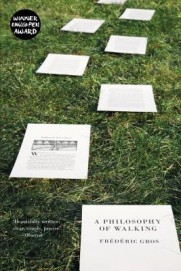 Frédéric Gros
Frédéric Gros




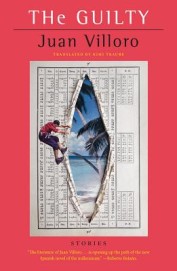 Juan Villoro
Juan Villoro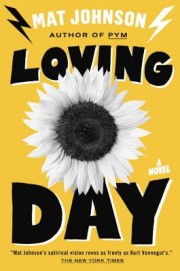
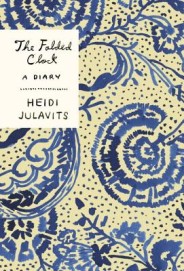
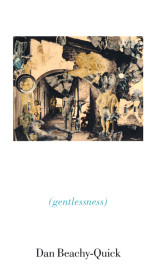
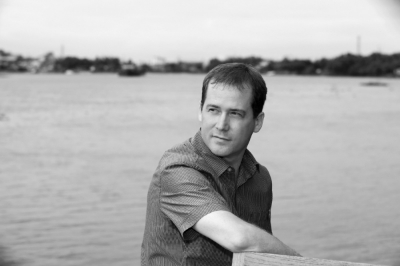 by Garry Craig Powell
by Garry Craig Powell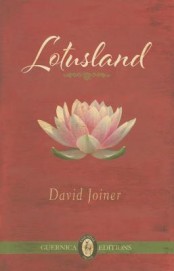
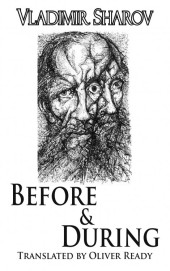
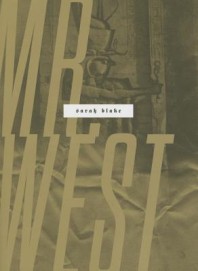
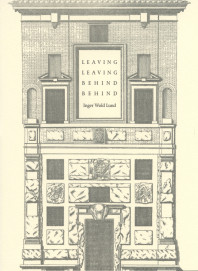 Inger Wold Lund
Inger Wold Lund